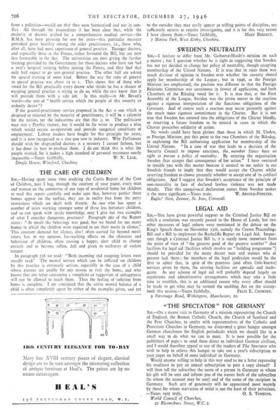THE CARE OF CHILDREN
SIR,—Having spent some time studying the Curtis Report of the Care of Children, may I beg, through the courtesy of your paper, every man and woman on the committee of any type of residential home for children to read this report carefully and make sure that, however perfect these homes appear on the surface, they are in reality free from the petty restrictions which are dealt with therein. As one who has spent a number of years working amongst some of these less fortunate children, and so can speak with inside knowledge, may I give but two examples of what I consider dangerous practices? Paragraph 26o of the Report states: " At meals the behaviour was good, but we found far too many homes in which the children were expected to eat their meals in silence." This constant demand for silence, alas! often carried far beyond meal- times, has, in my opinion, far-reaching effects on the character and behaviour of children, often causing a happy, alert child to change entirely and to become sullen, dull and given to outbursts of violent temper.
In paragraph 258 we read: " Both incoming and outgoing letters were usually read.' The mental torture which can be inflicted on children by this practice is extremely serious, especially in the case of a child whose parents are unable for any reason to visit the home, and who knows that any letter containing a complaint or suggestion of unhappiness will not be allowed to reach them. Thus the feeling of isolation from home is complete.. I am convinced that the entire mental balance of a child is often completely upset by either of the examples given, and yet to the outsider they may easily appear as trifling points of discipline, not sufficiently serious to require investigation, and it is for this very reason I have chosen them.—Yours faithfully, MARY BARNETT. 7 Marine Park, West Kirby, Cheshire.






























 Previous page
Previous page